KRISO, developing ultra-large-scale floating offshore wind power platform for first time in Korea
▶ The 15-MW floating offshore wind power platform acquired an AIP from the Korean Register of Shipping
▶ A letter of intent for technical cooperation was signed on October 6, along with a visit paid to the prototype demonstration
□ □ On October 6, the Korea Research Institute of Ships and Ocean Engineering (KRISO led by President Booki Kim) announced that its 15-MW floating offshore wind power platform had acquired approval in principle (AIP) from the Korean Register of Shipping.
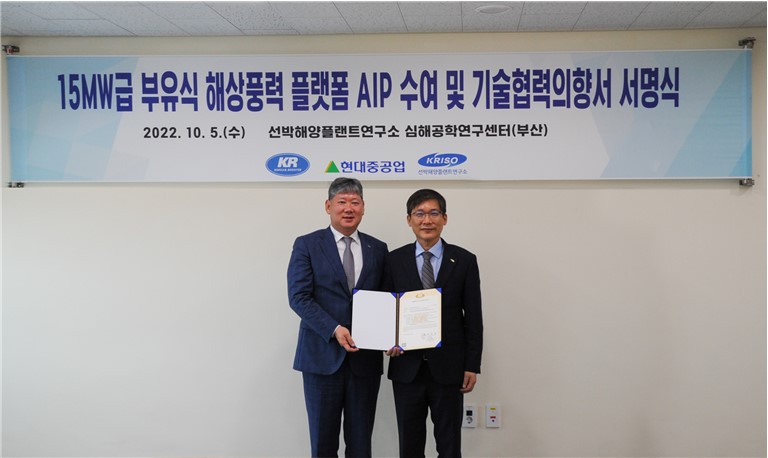
< Commemorative photo for AIP acquisition of Young-Seok Lee, Division Head of the KR (left), and Booki Kim, President of KRISO (right) >
□ This AIP acquisition is of great significance in that the 15-MW floating offshore wind power platform developed for the first time in Korea in line with the transition toward larger scale and floating type in wind turbine development has been design-certified.
* AIP (Approval In Principle): Refers to the procedure in which the stability and technical conformity of the concept and basic design of developed technology are verified and officially certified
□ A floating offshore wind power platform is composed of lower structures that support offshore wind turbines floating in waters, combined with a mooring system. A highly reliable platform is essential to power generation based on offshore wind power turbines. Global leaders in wind turbines have already developed and released large-scale wind turbine models with capacity of up to 15MW, but this was not the case for Korea until this achievement was made.
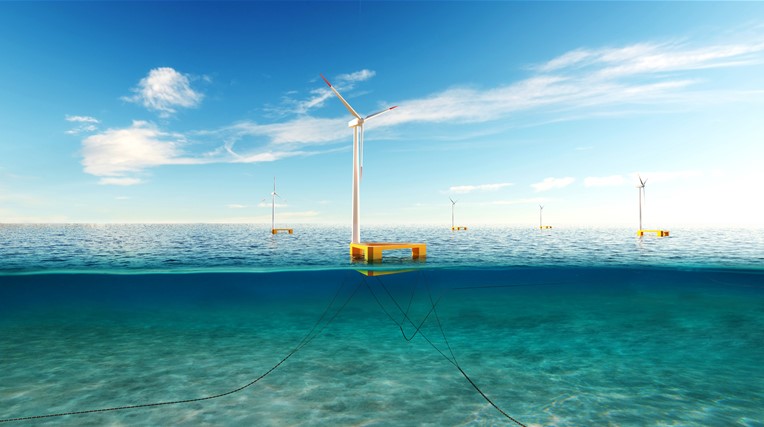
< The 15-MW floating offshore wind power platform developed by KRISO >
□ This 15-MW floating offshore wind power platform was developed by KRISO in cooperation with Front Energies (FE), an engineering company dedicated to offshore structures. The platform has already been verified for performance through a series of verification processes encompassing concept design, basic design, prototype testing, etc.
□ The developed platform is capable of reliable power generation even in high wave conditions and is also relatively easy to implement because the entire construction process, from part manufacturing to transport, assembly, and installation, has been designed to suit the conditions of the domestic production environment. Notably, installing this platform does not require large-scale installation ships, thus possibly leading to a shortened installation period and reduced costs.
□ Recently, global attention has been focused on the use of new and renewable energy sources as a means of overcoming the climate crisis. So far, wind power generation has been mainly based on fixed platforms, both onshore or offshore, recently, however, there has been a growing transition toward offshore wind power based on floating platforms. Floating offshore wind power generation is an effective approach to overcome spatial constraints and has the advantage that fisheries as a livelihood are less affected compared to when fixed offshore platforms are used. It is also possible to generate more power because stronger and more uniform wind conditions can be achieved.
□ According to Carbon Trust, an eco-friendly certification institute in the UK, the global capacity of floating offshore wind power generation is expected to increase to 286 MW by 2023 and further to 70 GW by 2050. The application of floating offshore wind power generation is expected to go beyond European countries, including the UK and Scotland, to include Asian countries and others. Indeed, the construction of a GW-grade floating offshore wind power complex has recently been started in the US. On the domestic front as well, GW-grade floating offshore wind power complexes have been planned in Ulsan, Jeju, Sinan, etc.
□ On October 5, the AIP granting ceremony was held at KRISO's Deep Ocean Engineering Research Center, followed by the signing of the letter of intent for technical cooperation with Hyundai Heavy Industries. On the occasion of the signing ceremony, the two parties agreed on close cooperation in the development and commercialization of 15-MW floating offshore wind power platform technology.
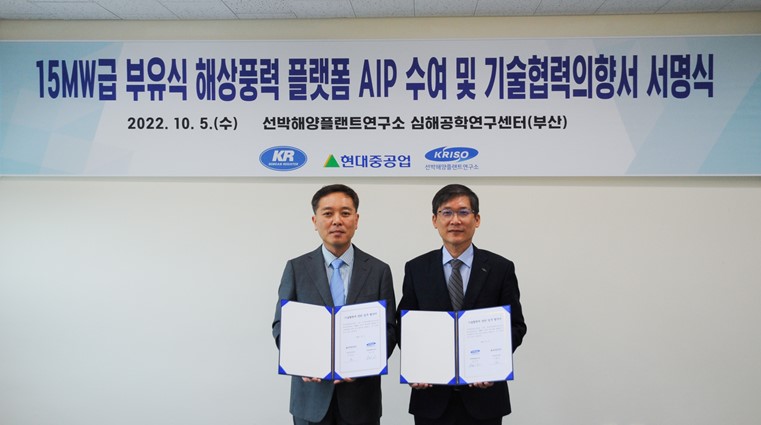
< Commemorative photo for the signing of the letter of intent for technical cooperation of Hyun-ho Lee, Institute Head of HHI (left), and Booki Kim, President of KRISO (right) >
□ Afterward, a prototype demonstration of 15-MW floating offshore wind power platform technology was held and attended by interested persons in the industry. Individuals from public institutions, including the Korea Energy Agency and the Korea Electric Safety Corporation, and domestic and international developers, including the Korea National Oil Corporation and Equinor, attended the demonstration, followed by a workshop in which recent trends on floating offshore wind power technology were introduced and shared.
□ Going forward, KRISO plans on promoting the development of offshore green hydrogen technology based on floating offshore wind power generation by applying the developed 15-MW floating offshore wind power platform to the offshore green hydrogen production model currently under development.
□ Kyong Hwan Kim, a principal researcher who led the project, said, "We have been proactively working to develop an ultra-large-scale floating offshore wind power platform with a capacity of up to 15 MW as part of our effort to achieve floating offshore wind power technology and thus carbon neutrality. It is a great pleasure that the developed platform has acquired an AIP from the Korean Register of Shipping."
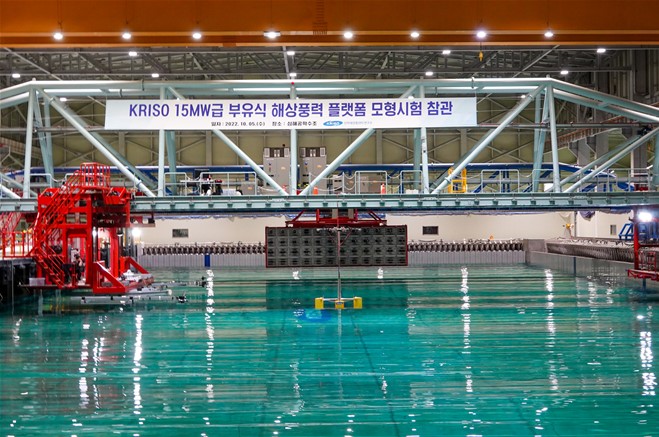
< Prototype test of the 15-MW floating offshore wind power platform conducted at the workshop >
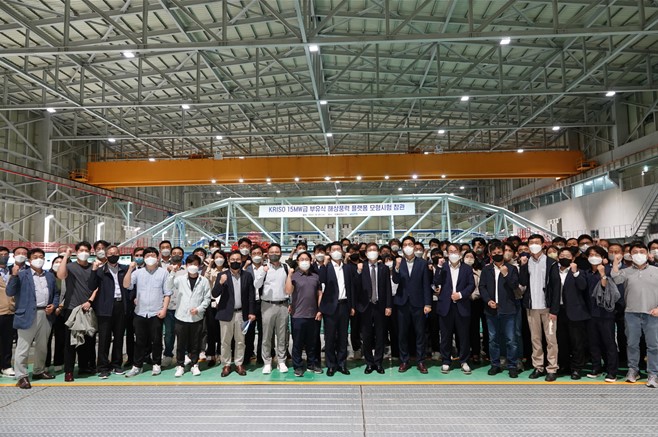
< Group photo of the participants at the workshop >
□ Booki Kim, the President of KRISO, said, "As a government-funded research institution, KRISO will be relentlessly committed to actively engaging in R&D activities and securing key original technologies while providing full support to private enterprises, thereby making floating offshore wind power based on Made-in-Korea technology the country's core energy source for the future."

 Research Project
{{data.S ? data.S.sum : 0}}
Research Project
{{data.S ? data.S.sum : 0}}

 Patent
{{data.P ? data.P.sum : 0}}
Patent
{{data.P ? data.P.sum : 0}}

 Technology Transfer
{{data.T ? data.T.sum : 0}}
Technology Transfer
{{data.T ? data.T.sum : 0}}

 Thesis
{{data.R ? data.R.sum : 0}}
Thesis
{{data.R ? data.R.sum : 0}}















